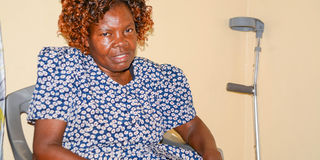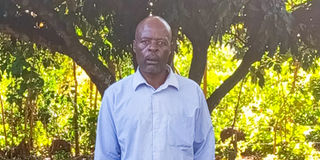Parkinson’s warriors: Amid costly treatment, stigma, and a lack of awareness, patients are finding ways to live with the disease

Agnenta Achieng Opiti, poses for a photo during his interview with Healthy Nation in Kisumu on January 16, 2025. Photo/Alex Odhiambo
What you need to know:
- While local data is not available on the extent of the disease, the World Health Organization says that the prevalence of Parkinson's has doubled in the past 25 years.
In 2015, Agneta Achieng, a secondary school principal travelled to Mombasa for the annual head teachers meeting. She recalls the warm weather and the soft breeze that welcomed her to the coastal region.
She also remembers something else that happened on the first day of the conference. In her telling, this is what happened: She went to the bathroom and as soon as she turned on the shower, her entire body began to tremble. Outside, it was hot and the shower water was warm.
"That was odd," she reflects. " It was the first thing that came to my mind. I turned off the fan but I was still trembling. Then in a moment, my limbs grew weak."
Was it the first time it had happened to you? I ask her.
"No. I had had that experience twice before but paid little attention to it thinking that I was either tired or overwhelmed. It wasn't until that morning that I started thinking that something strange was indeed happening to me."
Her son, who later noticed the occasional trembling, jokingly told her to stop drinking so the trembling would go away. Odd. Agneta had never tasted alcohol.
While sitting, her body would involuntarily lean to the right. If not supported, she would slump and fall. The tremor attacks, which she explains caused her body to shake for nearly half an hour, became more frequent.
“During such times, I could not engage in any house chores or hold anything,” says Mrs Opiti who reveals that at some point, the condition became so severe that she needed support to get to bed and had to be placed in a specific sleeping position.
Back at the hotel that morning, her female colleague arrived just in time to help her into a sitting position, where she rested for 30 minutes. Afterward, she dressed and left the room to join the other teachers for breakfast, though she couldn’t eat anything. At the meeting venue, the school head remained restless after experiencing two more tremor episodes. Noticing her distress, her colleagues suggested she visit a local health facility for a diagnosis.
“At the hospital, the health workers conducted a number of tests but all came out negative. They later insisted on a blood test and later announced that I had a blood infection,” she explains.
Painkillers were prescribed. The next morning, she travelled back to Kisumu. On arrival, Ms Agneta recalls experiencing another tremor and had to be rushed to her private consultant in Kericho town.
“On arrival, the doctor looked at me, listened to whatever I had to say before announcing that I had Parkinson’s disease,” says Mrs Opiti.
Symptoms: Tremors, difficulty speaking and painful muscle contractions
According to Mayo Clinic, Parkinson’s disease is a progressive disorder of the central nervous system that affects movement. The symptoms, which manifests as tremors, difficulty speaking and painful muscle contractions, begin slowly and may be unnoticeable at the first stages.
As the condition progresses, the affected person experiences body stiffness, difficulty with balance that may lead to falls, and slow movement. The person’s face may show little or no expression, and their arms may fail to swing while walking.
At the time the school head was visiting the health facility, she had experienced all the above symptoms.
She recalls how her relatives would often complain about her bent posture while walking as her hands remained stiff.
“When walking upright, I moved slowly, but when I bent my back, my speed increased, although my hands didn’t move,” she says.
Her doctor took the time to explain that the condition had no cure and could only be managed with daily medication.
She was also advised to eat plenty of fruits, exercise regularly, and consult doctors in case of an emergency.
Upon returning home, Ms. Agneta, who was also suffering from arthritis, had to make several adjustments. One of the first things she did was hire a helper to manage the house chores.
The teacher, who had been attending driving school, suspended her lessons out of fear of accidents during an attack.
“I also realised that some of the learners were struggling to hear me since I would be speaking softly,” she says.
The headteacher, who expressed concern about the lack of awareness regarding the condition, revealed that many of her neighbours believed she had been bewitched.
Others thought she was facing marital problems that had caused her depression and trembling, while some spread rumours that she was being punished by occult groups. “People said all manner of things,” she remarks.
Initially, accepting that she would live with the condition for the rest of her life was not only frightening for her but also for her family. Until the diagnosis, she says she was unaware of the condition.
“It took me a lot of time to accept the situation. I think what helped me was the fact that after taking my first prescription, the tremors subsided. I was ready for the management journey,” she explains.

Prof Charles Obonyo, a research scientist at the Kenya Medical Research Institute. Photo/Alex Odhiambo.
Professor Charles Obonyo, a research scientist at the Kenya Medical Research Institute (Kemri), says that Parkinson’s disease becomes more common as one ages and is more common among men than women. He explains that while there is no cure for the condition, management drugs are used to relieve its symptoms.
“Parkinson’s is also associated with previous occupations with some research showing that it mostly affects farmers who are exposed to insecticides,” he says.
Prof Obonyo adds: “The condition is also prevalent among footballers and boxers."
The researcher explains that since Kenya is an agricultural country with many individuals using insecticides, there are higher chances that more people are likely to develop the condition in the future.
While local data is not available on the extent of the disease, the World Health Organization (WHO) says that the prevalence of Parkinson's disease has doubled in the past 25 years.
Global estimates in 2019 showed over 8.5 million individuals with the disease. Current estimates suggest that, in 2019, the disease resulted in 5.8 million disability-adjusted life years, an increase of 81 per cent since 2000, and caused 329,000 deaths, an increase of over 100 per cent since 2000.
A study published in BMC Neurology revealed that Parkinson’s disease is the second most common neurodegenerative disorder.
“In Kenya, we have a big challenge in the name of care for the elderly which is in its infancy stage. A lot of our medical graduates are never taught how to care for the older adults,” he explains.
Story of Moses Makokha

Moses Mwangala Makokha, a retired teacher who was diagnosed with Parkinson’s disease in 2017. Photo/pool
Mr Moses Makokha, also a teacher was diagnosed with the disease in 2017, just four years after his retirement.
The 63-year-old explains that before his diagnosis; he started experiencing signs of the disease back in 1995.
It all began with fatigue on his neck down to the leg on the right side of his body. Sometimes, the affected area would also feel stiff but he never gave it much thought.
The symptoms became more serious in 2017 when he experienced tremors on the left side of his body, especially on the hands and legs.
“Writing on the chalkboard became a little hard since my hand would become stiff and I would also struggle to swallow food,” says Mr Mwangala.
Mr Mwangala was eventually diagnosed with Parkinson’s disease at the Cheranganyi Health Facility in Bungoma County.
The retired teacher also reveals that his late father had also displayed similar symptoms but died before being diagnosed.
Mr Mwangala laments the high cost of the drugs used for disease management which has forced him to dig deeper into his pockets on every hospital visit.
“I use up to Sh10,000 for a single dose and since I am retired, I can no longer access the medical scheme meant for teachers,” he says, adding that the responsibility of getting the tablets is now on his children.
The retired teacher also explains that the medications are often unavailable at the health centers and pharmacies in Bungoma County, where he resides.
Drugs come from Nairobi
Most of the time, he says, the drugs are sourced from Nairobi, forcing them to pay extra for transportation costs. Meanwhile, in Kisumu, Ms Agneta has also had to hire a driver to take her around whenever she needs to run errands.
Besides mobility issues, she explains that her role has been reduced to administrative duties, as she is often unable to write on the board or speak loudly in class.
The teacher is among 22 other Parkinson’s disease patients who often attend a monthly support group meeting at the Aga Khan University Hospital in Kisumu.
During the meetings, members spend over half an hour watching programmes about individuals living with the condition.
“The aim of this is to make us know that we are not alone in this; seeing other patients with the condition leading a healthy life is enough inspiration,” says Mrs Opiti.
Members spend most of the meeting sharing the challenges they face while receiving expert advice from a medic. She also reveals that part of her treatment involves exercising every morning and eating fruits daily.
“Initially, I would exercise while standing but my body has grown weaker. Nowadays I exercise while still lying on my bed by stretching my legs and lifting light weights for at least half an hour.
She also explains that it is important for patients to take their drugs as prescribed to avoid random attacks.
The school head says the last time she suffered a serious attack was in February 2024 after defaulting medication for days.
“Over time I have also grown to understand my body. I am always likely to suffer a tremor between 11 am and 2 pm,” says the 59-year-old.
Prof Obonyo explains that one out of every five elderly patients who visit health facilities for treatment suffer from neurological or mental conditions.
One percent of the total number he says are likely to be diagnosed or suffer from Parkinson’s disease.
“The Ministry of Health needs to make policies to take care of these patients, especially handling the drug issue before it becomes a public outbreak,” he says.
He adds: “The first line medicine for this condition is erratically unavailable in our health facilities. Another major concern is that the age characterised with a high prevalence of the disorder, 60 years, always finds the patients already retired and without an income source."
New study
In 2021, Kemri in partnership with Jaramogi Oginga Odinga University of Science and Technology (JOUST) embarked on a field project aimed at creating awareness on the condition, the disease prevalence and burden in Kenya.
The study which was conducted in partnership with the Africa Population Health and Research Center targeted various sites in Senegal through screening of those aged above 60 years.
Dr Omondi Dickens, a lecturer at the JOUST and the project's principal investigator says the patient participants were drawn from Nairobi, Kisii and Kisumu.
Dr Omondi explains the condition which is known to progress slowly is often diagnosed at a late stage due to a lack of awareness.
The data and reports available at the hospitals he says do not give a clear reflection of what is happening at the community level.
“During the fieldwork which ended last year on December 31, we assessed level four health facilities just to see how prepared they are to take care of the patients and realised that we do not have trained staff to diagnose and manage the condition,” he says.
He explains that patients with the condition have diverse needs and require mental and physical care.
Meanwhile, Ms Agneta can only hope that the government will work towards subsidising the drug prices and training more medical experts to attend to people like her.
"I also want to appeal to the general public to give us support and know that Parkinson's disease is not communicable,” she said.
[email protected]



